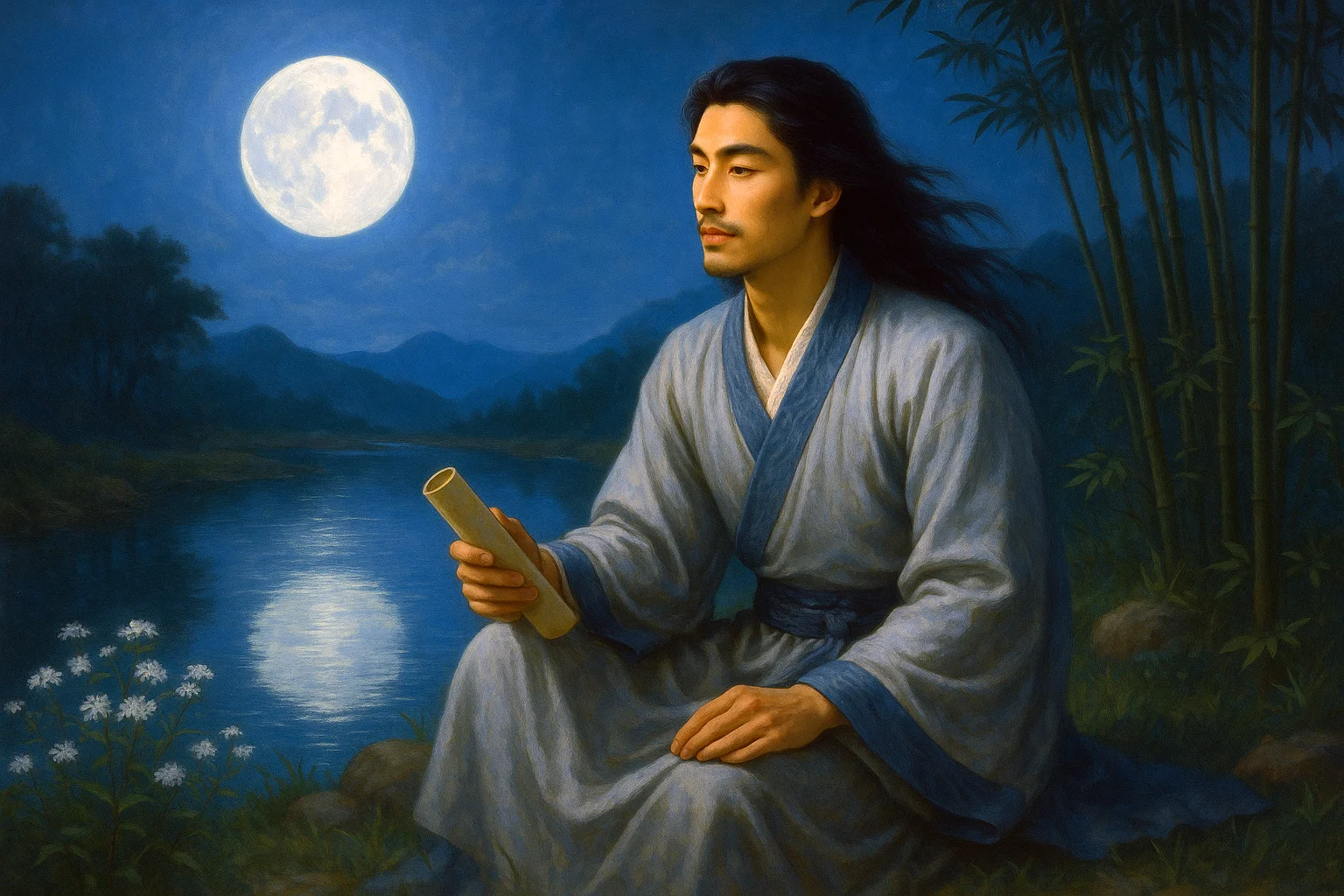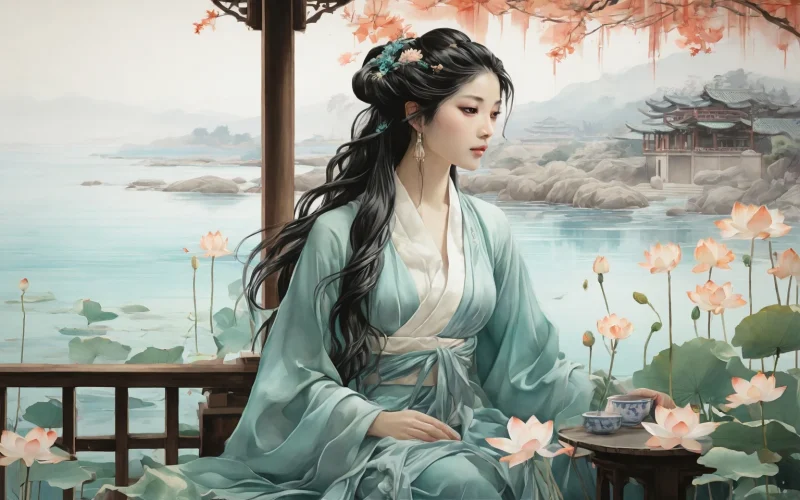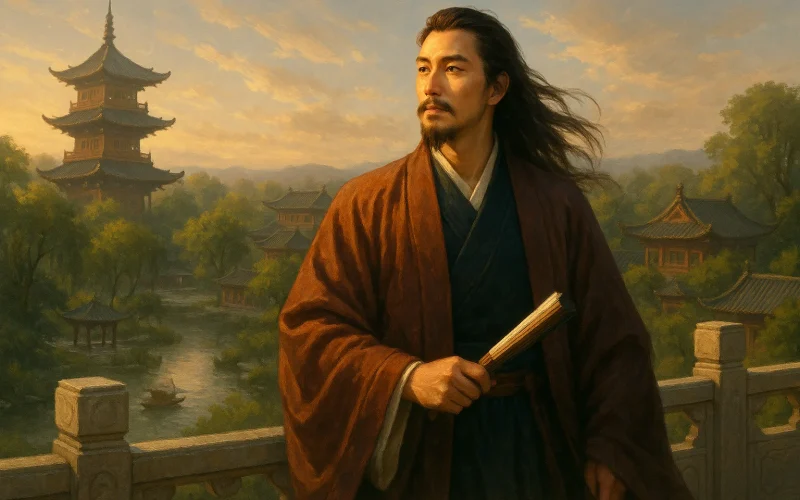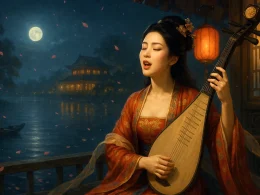The pavilion floats on hydrologic thought,
Daily docking winecups where clouds are caught.
Willows conspire with mist's soft coup,
Lotuses race to unveil pearl-dew.
City walls extrude from mountain hues,
Wave-sounds colonize all eaves' views.
Who claims Penglai's beyond our state?
Twin counties brew fairydom in this crate.
Original Poem
「环波亭」
曾巩
水心还有拂云堆,日日应须把酒杯。
杨柳巧含烟景合,芙蓉争带露华开。
城头山色相围出,檐底波声四面来。
谁信瀛洲未归去,两州俱得小蓬莱。
Interpretation
This poem was composed by Zeng Gong during his tenure as a local official, though its exact date remains unverified, likely written during his postings in Chuzhou, Qizhou, or Fuzhou. The Pavilion of Encircling Waves (环波亭) stands as a lofty structure by the water's edge, offering panoramic views of surrounding lakes and mountains. Its serene and elegant scenery provides the perfect setting for poetic contemplation. Through depicting the pavilion's seasonal landscapes, the poem expresses the poet's appreciation for natural beauty while embodying his yearning for an ideal realm of leisurely living.
First Couplet: "水心还有拂云堆,日日应须把酒杯。"
Shuǐ xīn hái yǒu fú yún duī, rì rì yīng xū bǎ jiǔ bēi.
At the water's heart linger cloud-woven mounds; / Each day demands a winecup in these bounds.
This couplet highlights the pavilion's most captivating feature - the illusion of clouds piling upon the water's surface. The poet, moved by the scenery, expresses his love for nature and transcendent mindset through the act of "raising a winecup," revealing a carefree and contented attitude toward life.
Second Couplet: "杨柳巧含烟景合,芙蓉争带露华开。"
Yáng liǔ qiǎo hán yān jǐng hé, fú róng zhēng dài lù huá kāi.
Willows artfully embrace mist-blended scenes; / Lotuses vie to bloom adorned with dewdrops' sheen.
This couplet portrays the beauty of plants veiled in misty rain - the willows' gentle sway complements the lotuses' vibrant bloom, creating a dynamic interplay of movement and stillness. The subtle yet poetic imagery reflects the pavilion's fresh and lively ambiance on a spring morning.
Third Couplet: "城头山色相围出,檐底波声四面来。"
Chéng tóu shān sè xiāng wéi chū, yán dǐ bō shēng sì miàn lái.
City-wall-framed mountains emerge in painted rows; / Beneath the eaves, waves sing from all sides as water flows.
This couplet captures the pavilion's sensory experience through both visual and auditory dimensions. The encircling mountain vistas and surrounding water sounds transport readers into this enchanting landscape where scenery and waves intertwine.
Fourth Couplet: "谁信瀛洲未归去,两州俱得小蓬莱。"
Shéi xìn yíng zhōu wèi guī qù, liǎng zhōu jù dé xiǎo péng lái.
Who believes Penglai's isles remain unclaimed? / Twin precincts already house its essence framed.
The concluding rhetorical question reveals the poet's conviction that his ideal world lies hidden within these real landscapes. By invoking the mythical realms of "Yingzhou" and "Penglai," the poet elevates the natural scenery to a celestial paradise, demonstrating his pursuit of a transcendental state beyond worldly concerns.
Holistic Appreciation
This poem builds upon magnificent landscapes, progressing couplet by couplet with layered descriptions. The opening couplet depicts the play of cloud shadows on the lake and the joy of wine, while the second portrays the beauty of mist-laden grass and dew-kissed trees. The third couplet expands the view from the pavilion, where mountain hues blend with wave sounds, broadening the poetic realm. The final couplet ingeniously introduces the "Penglai Immortal Realm", suggesting that Huanbo Pavilion's beauty has reached celestial perfection. Beyond praising natural scenery, the poet expresses yearning for an ideal reclusive life.
With fresh, natural language and an elegant, leisurely style, the poem maintains rigorous structure while flowing gracefully. It embeds emotion in scenery and ideals beyond objects, masterfully blending reality with imagination.
Artistic Merits
- Layered Scenery, Reality and Illusion Intertwined
Centering on "Huanbo Pavilion", the poem alternates between meticulous depictions of actual views and mythical allusions like Penglai, achieving sublime artistic conception through this interplay. - Subtle and Profound, Ambition in Scenery
Unadorned yet deeply suggestive language uses natural beauty to convey longing for freedom and ideals. - Harmonious Rhythm, Leisurely Pace
Each line forms a distinct vignette, flowing smoothly like a gentle breeze that transports readers into the poet's serene world.
Insights
This work demonstrates the poet's pursuit of unifying nature with life, the present with ideals. Though grounded in the mundane world, he discovers poetry and freedom in nature, constructing a spiritual Penglai through lakes, mountains, and mist. For modern readers, this quest for inner peace in nature remains inspiring. Wherever we are, maintaining a tranquil heart allows us to glimpse our own "Penglai" in daily life.
About the Poet

Zeng Gong (曾巩, 1019 - 1083), a native of Nanfeng in Jiangxi province, stands among the illustrious "Eight Great Masters of Tang-Song Prose." His writings distinguished themselves through an elegant classical balance, celebrated for their rigorous argumentation and refined literary craftsmanship. While his poetry embraced an artless subtlety, his prose achieved what critics hailed as "the very essence of purity" - an achievement that, though perhaps less dazzling than his contemporaries like Su Shi or Wang Anshi, earned him posthumous reverence as the founding master of the "Nanfeng Literary School."












